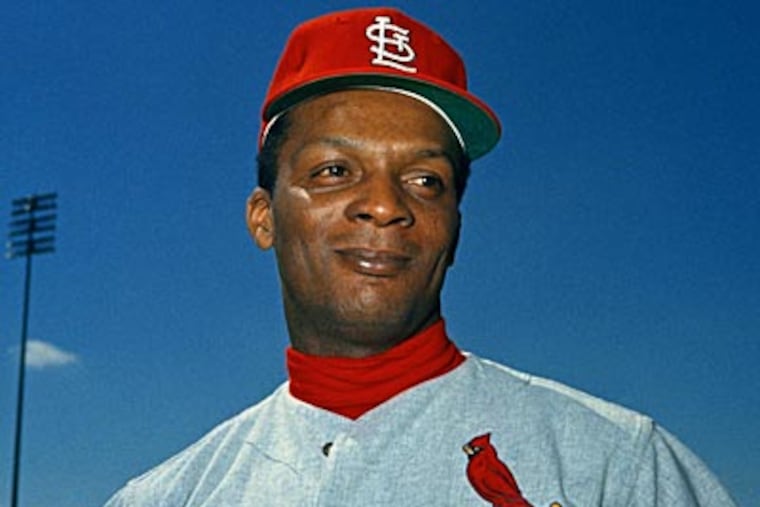Cynical documentary waters down contributions of Curt Flood
BACK IN THE DAY, when major league baseball resembled a half-vast plantation and teams owned players forever and a day, the Cardinals traded centerfielder Curt Flood to the Phillies.

BACK IN THE DAY, when major league baseball resembled a half-vast plantation and teams owned players forever and a day, the Cardinals traded centerfielder Curt Flood to the Phillies.
It was October 1969 and Flood got the news from the publicity guy, so far down the chain of command he rattled when he walked. Flood said, hell no, he won't go.
What he actually said was, "In the history of man, there's no other profession except slavery where one man is tied to one owner for the rest of his life."
People reacted to the slavery comparison like he'd set fire to their shoelaces. "Slavery?" they yelped, the man is getting paid $90,000 to play a game! Flood answered softly, "A well-paid slave is still a slave," and started down the brutal path of suing Major League Baseball, striving to get the reserve clause declared illegal.
It's all there, in a strange HBO documentary called "The Curious Case of Curt Flood," which debuts on July 13. Take the title. Please, take the title. The most curious aspect of the documentary is the emphasis on Flood's flaws.
The courageous athlete who dared to challenge an unfair system is depicted as an alcoholic, a womanizer, a woeful husband, a dreadful father, a lousy businessman and a fraud who never really painted those portraits he churned out that enhanced his image as an artist. And, oh yes, he was a chain smoker who died of throat cancer. In the history of warts-and-all biographies, this one slithers near the top of the list.
(First, this disclaimer. I was interviewed for over an hour by the writer and nothing I said appears in the film, even though I had tracked Flood down at the bar he owned in Majorca to get him on the record about his motives for rejecting the trade.
Philadelphia winds up dodging a bullet, because while the conservatives screeched about comparisons to slavery, the liberals ranted about his dread of coming to a racist city, and none of this is mentioned in the film.)
Sure, there's some fascinating footage of a young Flood appearing at a civil-rights rally in the deep South, at a time when black athletes ducked controversy the way they ducked chin-high fastballs.
And there are some significant moments with pitcher Bob Gibson, who roomed with Flood. Gibson says he was surprised that Flood was the guy to challenge the unfair system.
"Was I behind Curt?" he confesses. "Absolutely. But I was about 10 steps back just in case there was some fallout."
Which explains why no active players showed up at federal court when a flustered Flood was called to testify. Tim McCarver, who was part of that swap, says, "Curt realized he was isolated and I think he felt that isolation."
Marvin Miller, the aggressive head of the players' association, had warned Flood that he was riding a million-to-one shot with no chance of financial reward. Flood wasn't discouraged, thinking that fighting the good fight might help future generations of ballplayers.
Flood was a poor witness in that federal courtroom. Maybe the judge was hostile, maybe Flood would have benefited from better coaching.
Arthur Goldberg, a former Supreme Court justice, had agreed to take Flood's case. But when it trudged all the way to the Supreme Court, Goldberg choked, and there are snippets of his presentation that are painful to listen to.
One justice recused himself because he owned a handful of shares in Anheuser-Busch. Another swapped sides and the verdict came down 5-3 against Flood, with the Supremes suggesting that only Congress could squelch the antitrust exemption it had granted baseball.
Flood's life unraveled. He fled to Denmark, migrated to Majorca, where "he became owner, bartender and patron" of that bar. A good line, but mean-spirited.
The Washington Senators took a chance on Flood, but his skills had eroded and he quit after 13 wretched games of the 1971 season.
The filmmakers spare us the weary charade of polling current players, asking them to identify Flood and his place in baseball history. They remind the viewers that Flood lost in the courtrooms, and that it wasn't until 4 years later, when Miller had written arbitration into the basic agreement, that players became free at last.
An arbitrator ruled that Dave McNally and Andy Messersmith were free agents after playing out their contracts. The economics of baseball were changed forever.
Flood had sacrificed his career and ultimately his health, in pursuit of that same dream. He deserves a better tribute than this cynical documentary.
Send email to stanrhoch@comcast.net